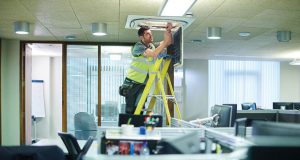 Blog from Raj Krishnamurthy, CEO, Freespace
Blog from Raj Krishnamurthy, CEO, Freespace
It’s time to think about the long-term. And, amidst the madness and uncertainty, take a positive stance. COVID-19 will be here for some time. More flexibility, pivoting and adaptation will be required. Yet, despite the regrettable but understandable side-step from the ‘return to work’ push, we must recognise that sometimes a step back is needed in order to have a running start. Therefore, this period should be used to plan, prepare, and collectively further our understanding on the long-term role technology will play in the office. The spotlight is on the enlightened FMs who are rightly resisting knee-jerk responses when it comes to deciding the fate of the future workplace.
COVID-19 has brought unprecedented personal and professional challenges. FMs have risen to this, acting swiftly to safeguard their employees and adapt to an unforeseen new way of working. They should be proud of that and take stock of the role they have played thus far. However, the journey is only just beginning. The latest ‘pause’ should be used to reanalyse the large-scale work from home experiment to address the dilemma they have on their hands when it comes to surplus corporate real estate. Workplaces are near empty and, coupled with social distancing rules when the time comes to return, have too much space to host what is predicted to be 30 per cent -50 per cent drop in occupancy. It’s time to reimagine how work is done – and what role offices will play – in creative and bold ways.
This has all shifted FM up the business agenda, and you can rest assured that it will remain at the top for some time. That’s because social distancing is going to transform the workplace. Effective workplace social distancing goes beyond removing desks or marking one-ways systems with coloured tape. Everything should be effectively configured with clearly marked and coloured coded desks and spaces which can be used each day. These systems can be displayed on digital signage throughout a building and on employee return to work (RTW) apps which allow an employee to pre-book a cleaned desk and co-ordinate diaries with colleagues. The overarching objective is to aid business continuity and keep people safe.
This is an opportunity for FM professionals to make a big difference. A combination of behavioural change and new systems, processes, policies and ways of working will be vital in achieving a safe return to work programme when the time comes.
Employers will need to remain proactive and nimble given the highly unpredictable situation and the constant possibility that additional outbreaks will occur. A data-led approach will support this and ensure longevity when it comes to business continuity and workplace safety and compliance. This insight, gleaned from workplace technology, can support FMs as they challenge plans to dramatically downsize property portfolios.
Space bookings and occupancy sensors which are linked to cleaning systems and processes can provide a highly effective and visual reassurance of internal COVID-19 control measures. There are fiscal benefits
to be had with this and it provides a full audit trail and traceability. Environmental sensors can also play a role with automated and localised adjustments to Building Management Systems (BMS) and HVAC conditions which are critical in maintaining a safe and healthy environment across different parts of the building.
However, workplace technology must be combined with proactive communication. Staff will want to be reassured that their employers have taken every possible measure to keep them safe and protected from infection risks with digital ‘building health’ displays linked to the BMS and digital signage. This demonstrates that the building is maintained within ‘safe and complaint’ environmental conditions.
Many of us want to get back to the workplace. But we need to accept the situation for what it is and work together to simply make things better and more streamlined for when we can eventually return to the office. It’s time to break from the past by dispensing with suboptimal old habits and systems. Change is here and we must accept and adapt to it. The union of FM and workplace technology will enable us all to create a better workplace experience for talent, improve collaboration and productivity, and reduce costs. That kind of change will require behaviour which is grounded in facts. Data from workplace technology can provide just that.




